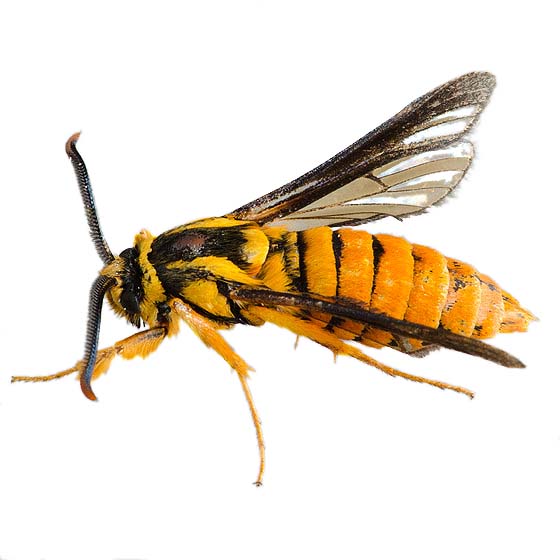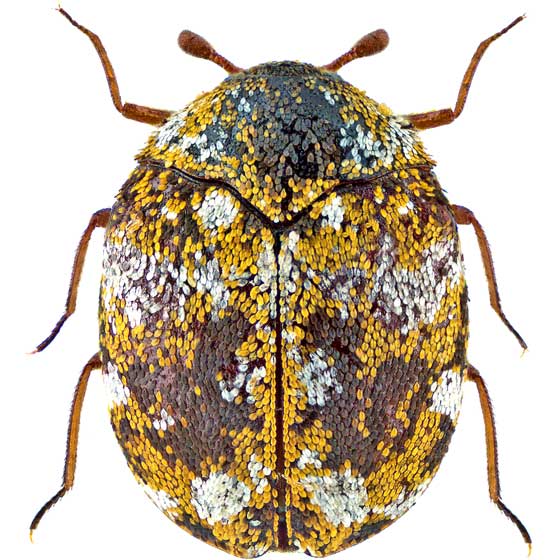
Like this beautiful Paranthrene simulans, many insects pests are worth studying for more than how to kill them. A moth that looks like a hornet but is soft on touch, and whose caterpillar doesn’t eat plants but drills tunnels in living oak wood… is it a pest or is it a biological wonder? Photo © Mark Dreiling
Annual Student Award for the Appreciation for the Biology of Insect Pests
We are proud to announce the winner for the fifth year of the Award: 2016. A great number of papers was submitted, perhaps the highest quality so far. Submissions were received from students all around the world, all works of great passion for insects, full of intriguing discoveries. The committee has decided on a single winner. The prize of $500 will go to:
Daniel Peterson, University of Massachusetts-Amherst, Massachusetts, USA
for his article “Micro- and Macroevolutionary Trade-Offs in Plant-Feeding Insects” published in American Naturalist, December 2016: “By fitting host-use data for Hemiptera and Lepidoptera to phylogenetic models, we found that neither long- nor short-term evolutionary trade-offs explain host-use specialization in these two major orders of plant-feeding insects.”
Congratulations, Daniel and coauthors! Thank you for your discoveries, and for your interest in the wonders of insects that are sometimes called pests. Our sincere thanks also go to all other students who submitted their papers. The complete list of submitted papers is below (see how great they were!).
The committee is not accepting applications in 2017. Please check back in 2018.
The award is supported by the TREE Foundation in Sarasota, FL, and conferred by the Ambrosia Symbiosis Research Group (Jiri Hulcr and Andrea Lucky at University of Florida, Rob Dunn at North Carolina State University, and Anthony I. Cognato at Michigan State University). Please send any further inquiries to hulcr@ufl.edu.

To most, this carpet beetle Anthrenus is just a domestic pest. But look closely, and you will see that it’s covered with specks of gold and silver. Why? No one knows… Photo Udo Schmidt, www.kaefer-der-welt.de
The list of papers submitted in 2016 that fulfilled all criteria
- Adekunle Adesanya: Host suitability and diet mixing influence activities of detoxification enzymes in adult Japanese beetles
- Andrei Bombin: The changing biodiversity of Alabama Drosophila: important impacts of seasonal variation, urbanization, and invasive species
- Andrew Bartlow: Walk or ride? Phoretic behaviour of amblyceran and ischnoceran lice
- Charles C. Y. Xu: Spider Web DNA: A New Spin on Noninvasive Genetics of Predator and Prey
- Derek A. Woller: Melanoplus foxi Hebard, 1923 (Orthoptera: Acrididae: Melanoplinae) rediscovered after almost 60 years using historical field notes connected to curated specimens
- Dineshkumar Kandasamy: Volatile Organic Compounds Emitted by Fungal Associates of Conifer Bark Beetles and their Potential in Bark Beetle Control
- Karl Roeder: From cryptic herbivore to predator: stable isotopes reveal consistent variability in trophic levels in an ant population
- Katrin Fitza: Host specificity and diversity of Amylostereum associated with Japanese siricids
- Loïc Dohet: Bacterial and fungal symbionts of parasitic Dendroctonus bark beetles
- Michal Filipiak: Nutritional dynamics during the development of xylophagous beetles related to changes in the stoichiometry of 11 elements
- Mohamad Haris Hussain: The efficacy of of synthetic food baits in capturing red palm weevil, Rhynchophorus ferrugineus (Coleoptera: Curculionidae) in campus area of Universiti Malaysia Terengganu
- Sulochana Paduyal: Field evaluation of the long-lasting treated storage bag, deltamethrin
- Veronica Rivi: Genomic and Cytogenetic Localization of the Carotenoid Genes in the Aphid Genome
- Yuan Zeng: Characterization of Antibacterial Activities of Eastern Subterranean Termite, Reticulitermes flavipes, against Human Pathogens
